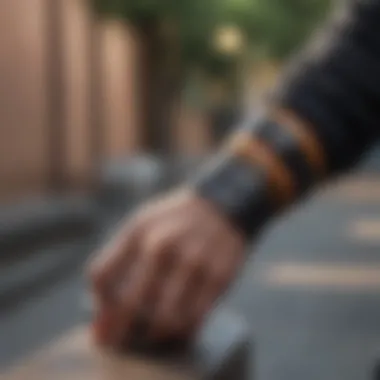Unveiling the Ultimate Skateboard Protective Gear for Extreme Sports Enthusiasts


Equipment and Gear
When it comes to exploring the world of extreme sports, such as skateboarding, having the right protective gear is paramount. The foundational piece of equipment that every skateboarder must invest in is a high-quality helmet, designed to protect the head from impacts and potential injuries. Brands like Pro-Tec and Triple Eight are renowned in the industry for producing top-notch helmets that prioritize safety without compromising on style. Alongside a helmet, knee pads and wrist guards are essential components of a skateboarder's protective gear arsenal. Brands like TSG and 187 Killer Pads offer durable and reliable knee pads that shield against abrasions and impact, while Triple Eight and Ennui deliver sturdy wrist guards to safeguard the wrists and forearms during falls.
In terms of maintenance, regularly inspecting gear for any signs of wear and tear is crucial to ensure optimal protection. Upgrades in protective gear technology, such as impact-resistant materials and adjustable straps for a custom fit, constantly push the boundaries of safety and comfort for skateboarders. Staying updated on these advancements can significantly enhance the overall skating experience while minimizing potential risks associated with the sport.
Introduction
Skateboarding, a thrilling form of extreme sports, demands not only skill and courage but also the right protective gear to ensure the safety of enthusiasts. This article delves deep into the world of skateboard protective gear, shedding light on the importance, types, and considerations that every skateboarder should keep in mind to stay safe and enjoy their adventures to the fullest.
Understanding the Significance of Skateboard Protective Gear
The Role of Protective Gear in Extreme Sports
Protective gear is not just an accessory but a crucial shield that safeguards skateboarders from potential injuries and accidents. In the realm of extreme sports like skateboarding, where risks are high, proper protective gear can be a lifesaver. The presence of protective gear instills confidence in riders, enabling them to push their limits while minimizing the risk of severe injuries. Skateboard protective gear acts as a silent guardian, allowing athletes to unleash their skills and creativity without compromising on safety.
Statistics on Skateboarding Injuries
Understanding the statistics behind skateboarding injuries is essential for highlighting the imperative need for protective gear. Studies reveal that a significant number of skateboarding-related injuries involve head trauma, fractures, and sprains, emphasizing the critical role of protective gear in preventing severe consequences. By analyzing injury data, we can comprehend the real-world impact of not wearing appropriate protective gear and the stark contrast it makes in mitigating potential risks. Additionally, statistics serve as a compelling reminder for skateboarders to prioritize safety by investing in high-quality protective gear for a secure and enjoyable riding experience.
Helmets: Safeguarding Your Most Vital Organ
In the realm of extreme sports like skateboarding, helmets play a pivotal role in ensuring the safety and protection of the most vital organ, the brain. Skateboarders face the constant risk of falls, collisions, and impacts that could have severe consequences without proper head protection. Helmets not only reduce the risk of head injuries but also instill confidence in skateboarders to push their limits while minimizing the fear of potential accidents. The significance of helmets in skateboarding cannot be overstated, making them an indispensable piece of protective gear for enthusiasts.
Choosing the Right Helmet for Skateboarding


Types of Skateboarding Helmets
When it comes to types of skateboarding helmets, one must consider the varied designs tailored to specific skateboarding styles and preferences. From classic half-shell helmets to full-face helmets designed for downhill riding, each type offers a distinct level of protection and coverage. Half-shell helmets are popular among street and park riders for their lightweight design and ventilation, providing ample protection without compromising comfort. On the other hand, full-face helmets are ideal for downhill and freeride disciplines, offering complete head and face protection against high-velocity impacts. Understanding the nuances of different helmet types is essential in choosing the right one that aligns with your skateboarding activities and safety needs.
Helmet Sizing and Fit Tips
Ensuring the proper sizing and fit of a skateboard helmet is paramount to optimize its protective capabilities. A well-fitted helmet should snugly cover the head without shifting or tilting during movement, offering a secure and comfortable feel. To determine the correct helmet size, measure the circumference of your head above the eyebrows and refer to size charts provided by manufacturers. Additionally, adjustable straps, padded liners, and dial-fit systems contribute to achieving a customized fit that enhances comfort and safety. Adequate ventilation, weight distribution, and impact-absorbing liners are also crucial factors to consider for optimal helmet performance. By following these sizing and fit tips, skateboarders can maximize the protective benefits of their helmet and enjoy a safe and worry-free riding experience.
Knee Pads: Protecting Your Joints from Impact
Skateboarding, being an extreme sport, places a considerable strain on the body, particularly the joints. In this section, we will delve into the critical role of knee pads in safeguarding skateboarders from impactful falls and collisions. Knee pads are instrumental not only in protecting against immediate injuries but also in preventing long-term joint damage, making them an indispensable part of any skateboarder's gear arsenal.
Importance of Knee Pads in Skateboarding
Materials and Design of Quality Knee Pads
When it comes to knee pads, the materials and design play a pivotal role in their efficacy. High-quality knee pads are often constructed using durable yet flexible materials such as heavy-duty plastics, impact-absorbing foams, and reinforced stitching. These materials work in unison to provide optimal protection to the knees, absorbing impact forces and dispersing them effectively to minimize the risk of injury. The design of quality knee pads is ergonomic, ensuring a snug and secure fit while allowing for unrestricted movement. Ventilation features are also integrated into modern knee pad designs to enhance airflow and comfort during extended skateboarding sessions. The incorporation of innovative materials like memory foam and Kevlar further enhances the durability and impact resistance of knee pads, making them a popular choice among skateboarders looking for superior protection.
Fitting and Maintaining Knee Pads
Proper fitting of knee pads is crucial to their functionality. Ill-fitting knee pads not only compromise comfort but also fail to provide adequate protection in the event of a fall. Skateboarders should carefully measure their knee circumference and refer to size guides provided by manufacturers to select the right fit. Adjustable straps and closures ensure a customized fit, preventing slippage during intense maneuvers. Maintaining knee pads involves regular inspection for signs of wear and tear, such as fraying edges or compromised padding. Cleaning instructions vary based on the materials used; however, a gentle hand wash with mild detergent is typically recommended. Adhering to maintenance routines not only prolongs the lifespan of knee pads but also ensures consistent performance over time, bolstering safety on the skateboard.
Wrist Guards: Shielding Against Fractures and Sprains
In this informative discourse surrounding skateboard protective gear, a keen focus is directed towards the pivotal role of wrist guards in shielding enthusiasts from fractures and sprains during their exhilarating skateboarding endeavors. Acknowledging the dynamic nature and inherent risks of extreme sports, the meticulous selection and adept utilization of wrist guards stand as crucial components in the pursuit of safety and injury prevention amidst the adrenaline-fueled skatepark setting.
Benefits of Wrist Guards for Skateboarders


Choosing the Right Wrist Guards
Embarking on the journey of comprehending wrist guards' significance necessitates an in-depth exploration of selecting the appropriate wrist guards tailored to individual needs. Delving into the realm of optimal wrist guard selection unveils a spectrum of considerations, ranging from material composition, ergonomic design, to impact absorption capabilities. The paramount essence lies in aligning the wrist guards' specifications with personal comfort preferences and protective requirements to ensure seamless integration into the overall safety apparatus designated for skateboarding enthusiasts.
Venturing further into the nuanced realm of wrist guards, the distinguishing factor of wrist guard variations hinges on their ergonomic construction and adaptive features, such as adjustable straps, breathable materials, and impact-resistant properties. Emphasizing the synergy between form and function, the chosen wrist guards should seamlessly blend with the individual's skateboarding style, facilitating unencumbered movement while steadfastly fortifying the wrists against potential injuries.
Proper Wrist Guard Techniques
Navigating the terrain of skateboard protective gear etiquette, the elucidation of proper wrist guard techniques emerges as a pivotal discussion point requisite for safeguarding against fractures and sprains effectively. Imbued with the essence of proactive injury prevention, adhering to meticulous wrist guard techniques encompasses leveraging the protective gear's full potential through correct fitting, positioning, and maintenance protocols.
Elevating the discourse on wrist guard application, a profound grasp of the correct technique for donning and utilizing wrist guards underscores the significance of user proficiency and diligence in fostering a secure skateboarding environment. Cultivating a disciplined approach towards wrist guard utilization encompasses cultivating a safety-oriented mindset, where attentiveness to detail converges with deliberate execution, culminating in enhanced protection and injury mitigation while embarking on daredevil skateboarding pursuits.
Elbow Pads: Preventing Impact Injuries
In this section of the article, we delve into the critical role of elbow pads in safeguarding skateboarders against impact injuries. As extreme sports enthusiasts, it's indispensable to understand why elbow pads are essential protective gear for maintaining safety during skateboarding sessions. These pads play a pivotal role in mitigating the risk of injuries, particularly to the elbows, which are vulnerable areas subject to impact while skateboarding.
The Role of Elbow Pads in Skateboarding Safety
Features of Effective Elbow Pads
Effective elbow pads are characterized by their durable construction and impact-absorbing capabilities. The key feature of these pads lies in their ability to disperse and absorb shock upon impact, thereby reducing the force exerted on the elbows. This feature is pivotal in ensuring that skateboarders can engage in high-intensity maneuvers without compromising their safety. The design of effective elbow pads focuses on providing a balance between protection and flexibility, allowing for natural movement while offering optimal impact protection.
Moreover, the unique feature of contoured padding in quality elbow pads enhances comfort and fit, reducing the likelihood of pads shifting during use. This ergonomic design not only increases wearability but also contributes to the overall effectiveness of the pads in preventing impact injuries.
Tips for Using Elbow Pads Correctly


Using elbow pads correctly is crucial for maximizing their protective benefits. Properly fitting and adjusting elbow pads is essential to ensure they stay securely in place during skateboarding activities. One important tip is to regularly check the fit of the pads to guarantee they provide adequate coverage and protection to the elbows. Additionally, communicating correct care instructions, such as hand washing or following manufacturer guidelines for maintenance, is vital for extending the lifespan and effectiveness of the pads.
Furthermore, utilizing elbow pads in conjunction with other protective gear, such as helmets and knee pads, reinforces overall safety measures. Understanding the correct positioning of elbow pads on the body, with the hard shell covering the elbow joint, is fundamental to optimizing their protective function. By adhering to these tips and guidelines, skateboarders can confidently rely on their elbow pads to prevent impact injuries and maintain peak performance on the board.
Gloves: Enhancing Grip and Protection
In the realm of extreme sports, especially skateboarding, ensuring proper grip and protection is paramount. Skateboard gloves play a crucial role in enhancing performance and safeguarding the rider against potential injuries. These gloves are not just accessories but are engineered to provide a firm grip on the skateboard and protect the hands during falls and maneuvers. By choosing the right gloves, skateboarders can elevate their riding experience while minimizing the risk of hand injuries.
Choosing the Right Gloves for Skateboarding
Materials and Styles of Skateboarding Gloves
When it comes to materials and styles of skateboarding gloves, diversity abounds to meet the specific needs of riders. From durable leather options to lightweight synthetic materials, skateboard gloves come in various styles to cater to different preferences. The choice of material impacts the level of protection, breathability, and comfort provided by the gloves. For instance, leather gloves offer superior durability and abrasion resistance, ideal for intense skateboarding sessions, while synthetic materials may provide flexibility and breathability for added comfort. Understanding the unique features of each material allows skateboarders to select gloves that align with their riding style and requirements.
Furthermore, the styles of skateboarding gloves can vary from full-finger designs for comprehensive protection to fingerless options for enhanced flexibility and tactile sensitivity. Each style has its advantages and disadvantages, depending on the individual's preference and the type of skateboarding activities they engage in. The key is to balance protection with functionality and comfort to ensure optimal performance on the board.
Glove Maintenance Tips
Maintaining skateboarding gloves is essential to prolong their lifespan and performance. Proper care and maintenance not only ensure the longevity of the gloves but also help uphold their protective capabilities. Regular cleaning with mild soap and water can remove dirt and sweat accumulation, preserving the integrity of the materials. Additionally, inspecting the gloves for any signs of wear and tear allows riders to address potential issues before they escalate.
Moreover, storing gloves in a cool, dry place away from direct sunlight can prevent premature deterioration and maintain their structural integrity. Avoiding excessive heat or dampness is crucial in preserving the quality of the materials. By following these glove maintenance tips, skateboarders can extend the usability of their gloves and continue to benefit from enhanced grip and protection during their skateboarding pursuits.
Conclusion
Prioritizing Safety with Skateboard Protective Gear
Key Takeaways for Skateboarders
When it comes to skateboarding, one of the most crucial aspects revolves around selecting the appropriate protective gear. The key takeaway for skateboarders is the necessity of investing in high-quality gear that adheres to safety standards and provides adequate protection during intense skate sessions. By prioritizing safety, skateboarders can minimize the likelihood of injuries and enjoy their sport with greater peace of mind. The durability and impact resistance of the gear play a pivotal role in ensuring long-term protection for skateboarders against falls and accidents.
Embracing a Safety-First Mindset
Embracing a safety-first mindset is not just a recommended approach but a fundamental requirement for all skateboarders, especially those engaging in extreme or high-risk maneuvers. This mindset involves understanding the risks involved in skateboarding and taking proactive measures to mitigate them through the use of appropriate protective gear. By making safety a top priority, skateboarders can prolong their skateboarding longevity and minimize the chances of sustaining serious injuries. The emphasis on safety-first also promotes a culture of responsibility and mindfulness within the skateboarding community, encouraging others to follow suit and prioritize their well-being above all else.















